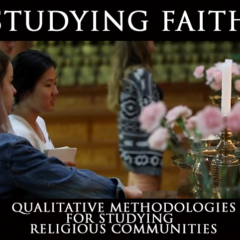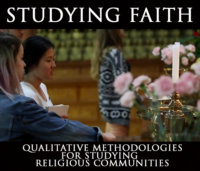Your instructor may provide you with some guidance concerning the group or groups to be studied, or you may pursue this investigation based on your own research interests. Either way, you can find information about different groups from organizational websites, social media platforms like Facebook and Twitter, online blogs, magazines and news articles, or even by a walking or driving tour of the area. Check out CRCC’s resident journalist Nick Street’s blog discussing his experience and observations walking the neighborhood of Los Feliz in Los Angeles.
However you may go about finding a field site, do consider the following issues when choosing a group:
Interest
Conduct fieldwork with a group that you are interested in learning more about. It will be more challenging and enjoyable if you chose to study something that piques your curiosity. The basis for this interest could be that you once attended a service with a friend, that one of your friends is a member or that you read or heard something intriguing about the group. Your interest could arise from any number of reasons.
Accessibility
Choose a field site that is accessible to you and that has enough activities for you to study in the time available to you. Consider the timing of the activities of religious services of the group and whether you are able to attend them regularly. Determine the time and place of religious service through any of the conventional means of learning about the events of an organization: make a phone call or send an email to the administrators, or go online and check out their calendar.
Language
Make sure you are proficient in the language that is predominantly used in the particular field site, in terms of the service, the language spoken by the majority of its members, etc. If you are not fluent in the language, bring or arrange for an interpreter.
Gatekeepers
When studying a hierarchical religious institution, seek access to the field site by getting in touch with “gate-keepers,” like managers, volunteer organizers or board members. Sometimes you can use personal contacts to facilitate access into the field site. For example, does a friend’s sister or family member attend the mosque you’re interested in studying? Speak to the person and ask them more about the mosque, its activities and its role in the community. Ask that individual to help you gain access to those with authority, such as the imam.
If you do not know a gatekeeper personally, you can likely find information about the site online. Make sure to gain permission and access before going to the field site. This can usually be done with a phone call to the church or other religious institution. If you are not able to gain access before going be sure to bring the proper identification so you can gain access once there. (See the section on legitimacy.)
How can a suitable “gatekeeper” help research access a faith community?
Watch this video to hear researcher Hebah Farrag share her experience of finding a suitable “gatekeeper” for a religious community.
Context
The socio-political context of the group you study is important. Learn about the social world surrounding the congregation and be conscious of these issues when approaching the group. Remember, the information you receive from leaders or influential members may be different than the information you receive from lay members. If there are factions or tensions in the group, be careful how you navigate the situation. In long-term fieldwork experiences, you may be asked or implicitly expected to take sides.
Legitimacy
Make sure that you bring the necessary identification and written documentation about yourself, your project and its purpose. Sometimes this may require formal letters of introduction from professors or other university paperwork. Consider in advance how you will present yourself and your research when you meet new people in the field. Consider how you will respond to questions such as: What are you doing here? What do you want to know about me/us? Who sent you? Who is funding the research? Who will benefit from this research? How long will you be here?
Confidentiality
Assure individuals of confidentiality and anonymity, or ask religious leaders for permission to use their name. Store your recorded interview data in a secure place. Do not share your research notes with your friends or family.
Nalika Gajaweera was a senior research analyst with the USC Center for Religion and Civic Culture through 2023.
Andrew Johnson is a contributing fellow with the USC Center for Religion and Civic Culture.

